What are the best sweeteners for the keto diet? Check out this comprehensive guide to baking with sugar substitutes, and learn how to get the taste and texture you crave!
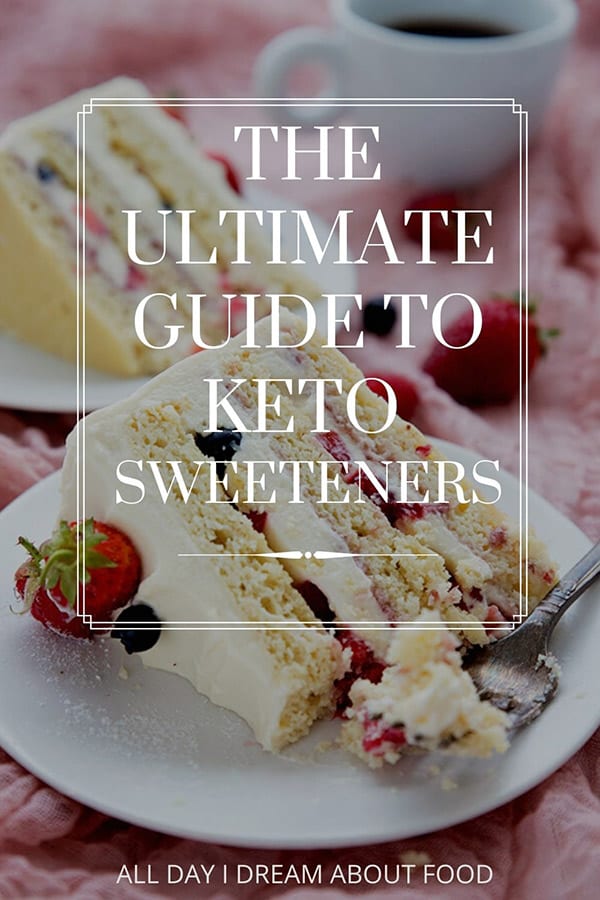
Today, my keto friends, I am imparting some of my vital knowledge and deep wisdom about using keto sweeteners. We will discuss all of their pros and cons, and how they affect the outcome of your keto desserts.
In advance of the holiday baking season, I figured you could put this information to good use. Because if you’re anything like me, you like to get an early jump on your keto holiday cookies!
This is actually an abridged version of the in-depth keto sweetener section in my book, The Ultimate Guide to Keto Baking. I think you will find it very informative.

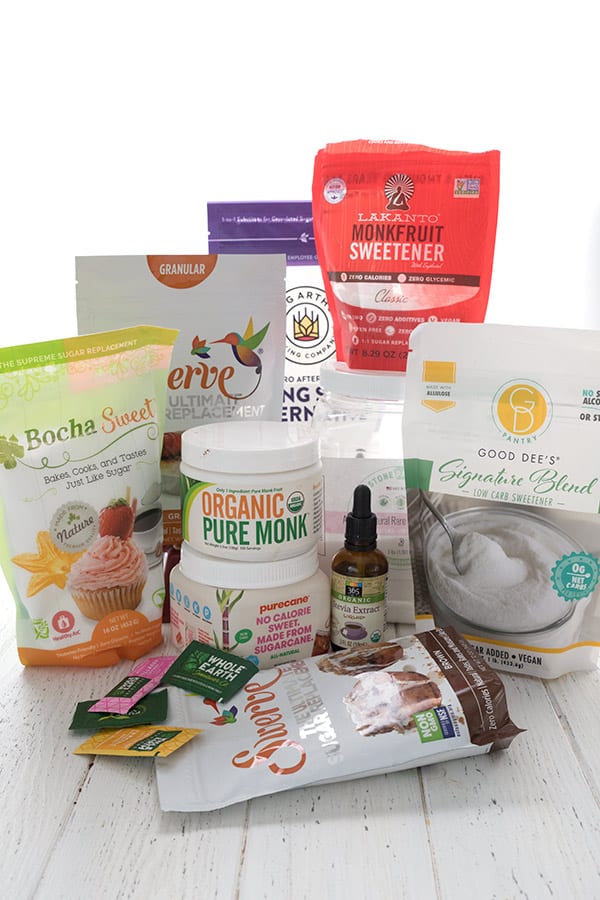
What is the best keto sweetener?
I’m sorry, I simply cannot answer that for you.
I’m not being willful or stubborn, or deliberately withholding information. It’s simply that there is no such thing. Yes, you read that right – there is no such thing as the best keto sweetener.
Here’s why: Everyone experiences these sugar substitutes differently. It’s almost as individual as the individual themselves.
- Some people experience an unpleasant aftertaste with one and not another.
- Some people suffer from GI issues or headaches when consuming certain sweeteners.
- Some people see a blood sugar rise when other people do not.
- Some people may even experience an allergic reaction to certain sweeteners.
With the sugar substitutes market constantly expanding and changing, it’s much more about finding what sweeteners work best FOR YOU.
What are the best sweeteners for keto baking?
Ah, now we’re on to something. This is my territory and one that I have researched extensively. I have experimented with a wide array of sugar substitutes and I can tell you straight up that none of them behaves exactly like sugar.
They all have very different properties and the sweetener(s) you choose will impact the outcome of your recipes. The trick is to understand their different attributes and use them to advantage.
Consider the final product before choosing your sugar substitutes. What are you trying to make? What consistency are you trying to achieve? Do you want it crisp or soft? Chewy or cakey? Should it be gooey or firm?
Most of the popular brands on the market are actually blends of two or more keto sweeteners. For simplicity’s sake, I am going to break them down into their main ingredients.
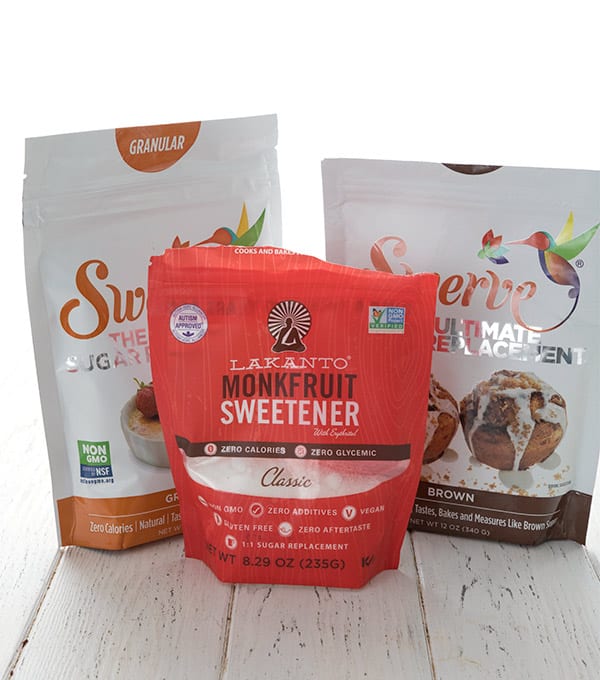
Erythritol
What is it?
Erythritol is a sugar alcohol (polyol) that is naturally present in some fruits and fermented foods. For mass production, it is made by fermenting a glucose syrup with enzymes.
It is unique among sugar alcohols in that it has zero carb impact. Our bodies simply do not recognize it as a carb so it does not impact blood sugar at all. And unlike many sugar alcohols, it does not cause gastrointestinal issues for most people.
How does it work?
Similar to sugar:
– Erythritol mimics sugar in its crystalline structure, so it helps whip air into butter and egg whites.
– It also browns and crisps up nicely and it can even be coaxed into caramelizing.
Differs from sugar:
– It’s only 70% as sweet as sugar, which is why most brands combine it with other sweeteners, to make it measure cup for cup.
– It’s non-hygroscopic, meaning that unlike sugar, it does not attract or hold onto moisture, which can cause baked goods to be dry and crumbly if they don’t have enough fat.
– It can re-crystallize as it cools, particularly in liquid applications like sauces, custards, and ice cream.
– Some people experience a mouth-cooling sensation, similar to sucking on a mint. Not everyone experiences this, and often mixing it with other sweeteners eliminates this sensation.
Major Brand Names: Swerve, Lakanto (this is mostly erythritol… do not be fooled by the fact that it calls itself a “monk fruit sweetener”), So Nourished, ZSweet.

Xylitol
What is it?
Xylitol is also a sugar alcohol found in some fruits and vegetables, as well as in wood and corn. It is usually manufactured commercially from corn or birch trees.
Some, but not all, xylitol is absorbed by the intestines into the bloodstream. This means it can cause some gastrointestinal discomfort when consumed in large amounts. It can also have an impact on blood sugar.
WARNING! The biggest issue with xylitol is that it is highly toxic to dogs.
How does it work?
Similar to sugar:
– It has a crystalline structure so it can whip air bubbles into butter and egg whites. It’s also as sweet as sugar.
– It’s more hygroscopic than erythritol so it attracts moisture and it doesn’t re-crystallize as it cools. Xylitol is great for ice creams and sauces to keep them soft.
Differs from sugar:
– Xylitol doesn’t caramelize or crisp up very well. This can cause problems for baked goods that need a crisp texture, like many keto cookies. They will turn out much more cakey and soft if you use xylitol.
– Definitely do NOT use for meringue, as it will stay gooey and soft, and won’t come off the parchment paper.
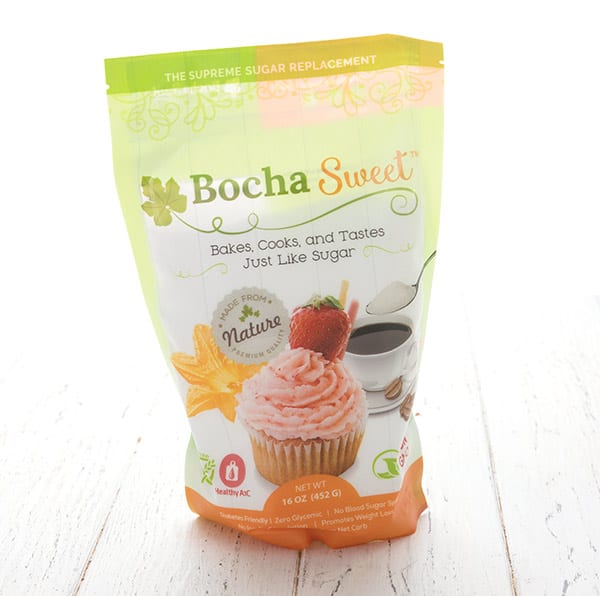
BochaSweet
What is it?
BochaSweet is the brand name of a unique sweetener derived from the kabocha squash, a type of winter squash also know as Japanese pumpkin.
Like erythritol, it seems to have little to no impact on most people’s blood sugar. But like xylitol, it can cause some gastrointestinal upset when consumed in large quantities.
In many ways, BochaSweet functions a lot like xylitol (they are both pentose sweeteners), but it does not appear to be toxic to household pets.
How does it work?
Similar to sugar:
– BochaSweet is as sweet as sugar and so can be used as a cup-for-cup replacement, without an apparent aftertaste.
– It is more hygroscopic and doesn’t re-crystallize so it’s great in sauces, custards, and ice creams. (I have started using it in combination with Swerve in all of my keto ice cream… they stay scoopable even straight from the freezer!).
Differs from sugar:
– Just like xylitol, BochaSweet will not crisp up or brown very well. Cookies end up soft and cakey, and meringues are so gooey that they won’t come off the paper.
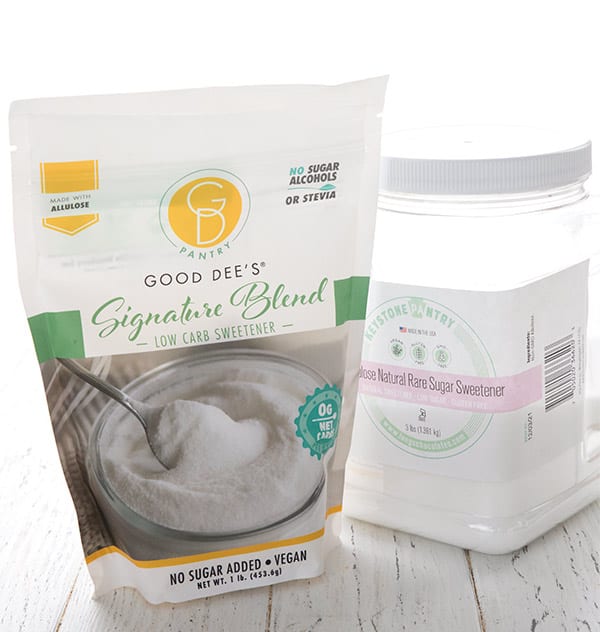
Allulose
What is it?
Allulose is a relative newcomer on the sugar alternative scene and has become incredibly popular. It is a monosaccharide, which means it really is a “sugar”, but one that our bodies don’t treat like a sugar or a carb. It is largely excreted without ever affecting blood glucose levels.
However, I caution you from personal experience that large amounts can cause serious GI distress. Many people don’t seem to suffer from this, but some of us do and it’s…not fun.
So it’s worth testing on yourself in small amounts and building up from there.
How does it work?
Similar to sugar:
– Allulose caramelizes nicely and tends to be hygroscopic, keeping sauces and ice creams soft, and baked goods tender.
Differs from sugar:
– Allulose is only 70% as sweet, which means you need more to sweeten your desserts.
– While it caramelizes well, it doesn’t crisp up well and baked goods tend to be soft and cakey. Even just a little allulose, in combination with other sweeteners, can prevent your cookies from becoming crisp.
– It can over-brown the outside of baked goods, especially the parts that are touching the sides of the pan. Cakes can have a dark, almost burnt appearance, although they aren’t over-cooked.
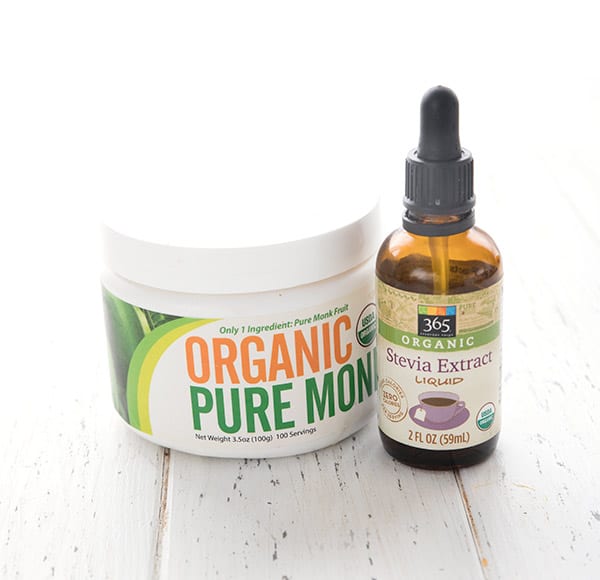
Stevia and Monk Fruit
I am lumping these two together because they have many similar properties and behave much the same way.
What are they?
Both stevia and monkfruit are naturally derived, plant-based sweeteners that are hundreds of times sweeter than sugar. Because they are extremely concentrated, a tiny amount can sweeten a whole recipe.
While that may sound like a good thing, it can have major implications for your keto baked goods. Read on…
How do they work?
Concentrated sweeteners like these have no “bulk” – they have little in the way of weight or volume so they don’t add much to your recipe other than sweetness. They can’t contribute anything to texture or consistency, and they don’t caramelize, crisp, or brown your baked goods.
Bulk is an important factor in anything from cupcakes to frosting. Substituting a non-bulk sweetener means your keto treats may not rise properly, may be more fragile, and may not set properly.
“Monk fruit sweetener”
Please be aware that many brands that bill themselves as “monk fruit sweetener” are actually mostly erythritol. The main ingredient is erythritol, with a little monk fruit to make it sweeter. This means that the sweetener will behave mostly like erythritol.

How to use sugar substitutes
I’ve thrown a ton of information at you and I know it’s hard to digest it all. I do this for a living and still I have times when a certain sweetener doesn’t behave the way I think it should. But here’s a quick cheat sheet on what to use when:
Want crisp keto cookies? Use erythritol based sweeteners like Swerve, Lakanto, or So Nourished. Other options will make your cookies soft and cakey. I highly recommend Swerve Brown for the best brown sugar substitute for cookies!
Making a keto cake recipe? Use any sweetener that has bulk (erythritol, BochaSweet, xylitol or allulose), but do be forewarned that some are not quite as sweet as sugar and you may need more of them.
Making a keto frosting? You need a bulk powdered sweetener to give your frosting structure. Erythritol, xylitol, and BochaSweet all have confectioners (powdered) versions. Allulose may as well but I am unsure of brands.
Want a gooey consistency? Try using BochaSweet or allulose, or combine it with another erythritol based sweetener. This combo is perfect for things like keto caramel sauce or my keto pecan pie.
Want keto ice cream that stays scoopable for days? My recommendation is half Swerve and half BochaSweet or allulose. Using only erythritol based sweeteners makes your ice cream rock hard, and all BochaSweet makes it too soft (it stays like soft serve!).
Just trying to sweeten your coffee? Use whatever you like best. They all work well if you don’t need a certain consistency so this is a matter of personal preference.
Still have questions?
Leave a comment and I will do my best to answer!
Adding to the confusion is that many brands on the market are blends of the keto sweeteners I outlined above. Blending sugar substitutes can maximize their sweetness and reduce potential aftertastes.
But I’ve tried such a wide array of sweeteners, I have a good idea of how most of them work. I can also take an educated guess based on the ingredients list. So drop me a line and I will give you all the information I can.

Free Bonus: Secrets to Keto Baking!
Sign up for your favorite recipes delivered straight to your inbox plus get our FREE bonus: Secrets to Keto Baking!


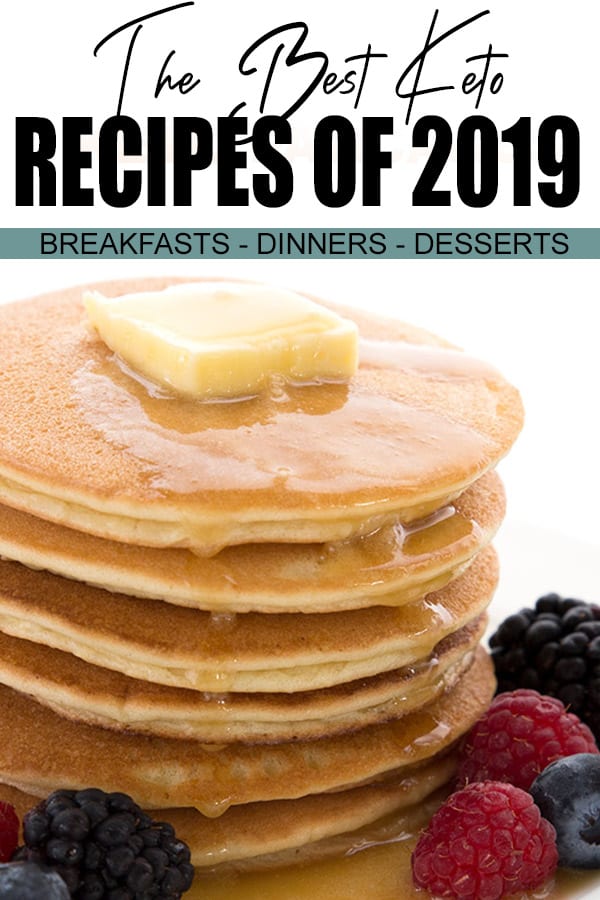


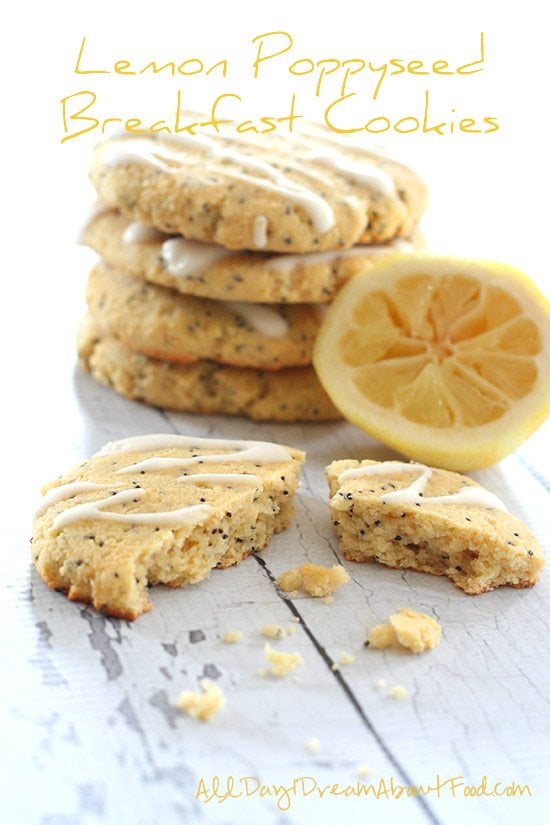
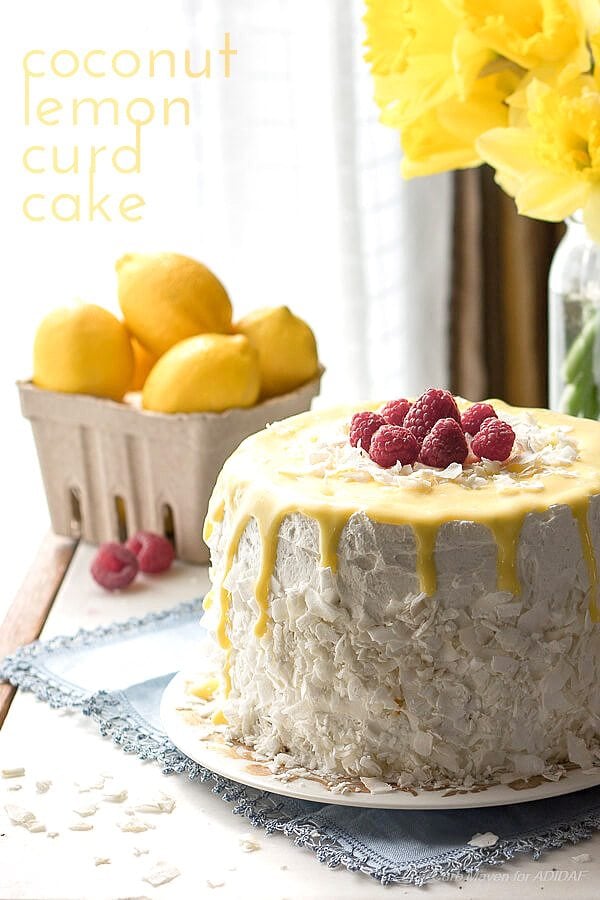









What would be the best sweetener or combo of sweeteners to achieve a chocolate chip cookie that’s crisp on the edges and chewy in the middle? Or is this asking too much of keto baking?
Thank you for all of your time and research.
I really want to try your recipes. They look delish. But I was wondering if you have any info or have tried any of the Trim Healthy Mama Sweetners or if you can suggest how they can be used as substitutes? I’ve used them for a while and like them a lot. I usually get the ones mixed with erythritol. one is called Gentle Sweet and another one is Super Sweet. I would love to hear your suggestions on how these could be used. Thank you!
I don’t really use them but I believe they have conversion charts on their website.
You don’t mention Truvia which seems to be a good erythritol based sweetener, which in turn should make it ideal for cookies. based on price I’m having a hard time convincing myself to try Bochasweet. Is it that good for baking? love your site.
Truvia is just a brand name. I recommend allulose over bochaSweet.
hi, I have been baking keto hazelnut chocolate cookies for a while now, but it has now been leaving a bitter after taste and its really soft and crumbly, I’m putting in the recipe that I have been using till now:
Keto Sample recipe with Toshe Chocolate
– [ ] 2.5 tbsp stevia 33g
– [ ] 6 tbsp hazelnut butter 74 gms
– [ ] 3/4th cup unsalted butter 180 gms
– [ ] 1/2 tsp salt
– [ ] 2 eggs
– [ ] 2tsp vanilla
– [ ] 2tbsp coconut flour
– [ ] 1.5 cups almond flour
– [ ] 1 tsp baking soda
– [ ] 1/2 cup chopped hazelnuts 80gms
– [ ] 1 cup choco chips
the chocochips are covoture and dark chocolate sweetened with sweetener (stevia)
I would appreciate a feed back as to what’s going wrong,
This is not my recipe so I am not sure how you expect me to address the issue?
Hello, can you talk about the Swerve Allulose Blend sweetener? Is it an all in one good to use in baking? Love your work! Thank you
All of the info relating to allulose applies to this product, as it is mostly allulose.
Hello. If I wanted to make a Keto friendly hard candy, which sugar would you recommend?
Erythritol.
THANK YOU, THANK YOU for your honesty and lack of pushing that a specific brand (one you’ve created) is the one-and-only! I tire of seeing those and, yes, most usually, immediately delete them. Perhaps, but I’m extremely doubtful, those self-created brands/products are all that will work, but I refuse to continually to purchase one sweetener after another, when I already have a variety already on hand.
Hello there.
What a great resource for people like me – I love to experiment with keto baking! I am wondering why you haven’t covered the most common sweetener out there – Splenda. I have heard that some people have GI side effects with Splenda, but I use it a lot in my baking and the only thing I have found is that it is pretty non-hygroscopic. Your opinion on this would be helpful!
Thank you for all your excellent research and recipes.
Barbara
Because it’s not a naturally based sweetener.
Just want to thank you sincerely for your work. Your recipes have been a complete game changer in our mostly keto/gluten free family!
G’day, new to your sight.
I’m allergic to wheat so looked at a couple of your recipes. Can I use normal sugar. normal everyday, sugar cane sugar in place of the sweeteners (which I actually had a severe allergic reaction to in my teenage years, so stay away from them like the plague!!)
if I can, do you know if it would be the same amount of measurement. a one for one swap.
ta muchly, the recipes look great 👍
Simone
I am sorry, I don’t use sugar so I can’t really advise.
I’d love your take on “Whey-Low” sweetener, which is a different kind (website: wheylow.com).
thank you Carolyn, I am grateful that you’re prepared to share your exp and expertise. it is a challenge as I work my way through the keto lifestyle. I’m loving how good I’m feeling and have lost 8kg, so very positive changes in my life at 70. I’m learning from generous professionals like yourself that I can still have some old life goodies 😀 thank you
Congrats!
Hi Carolyn, are you aware that Bocha Sweet are now saying that their sweetener should not be consumed by household pets because of its similarity to xylitol? Just a heads up.
Thank you! It is straight up xylitol and they’ve changed their marketing to be up front about that. I’m hoping Carolyn edits this post to reflect that it is quite dangerous to dogs.
Hi Carolyn,
Today I purchased Swerve Confectioners and noticed they have now added tapioca starch to the ingredients… do you have any ideas why?
Thanks a lot.
They changed all of their formulas last year. I can’t say why, I am not privy to that info. But the tapioca starch is very minimal, to prevent caking.
Can’t thank you enough for the info. I find your site is loaded with the best receipes. The sugar substitute class cleared up many questions. I find I’m looking up information every day. You never disappoint!!
That’s odd. I am just the opposite of what you can tolerate. You can tolerate erythritol, but can’t tolerate allulose. At least when this post was written.
I tolerated Swerve and erythitol for about a year. Then terrible diarrhea.
I can tolerate allulose, but I am keeping sweets to a very limited amount.
I have been a fan for years, you are my go-to for almost all low carb recipes! I just reviewed this guide again, thanks! It was a good refresher on the products in my pantry.
I’m a Bocha fan, so it sounds like I should get used to cakey cookies, lol.
yes I want to make your girl scout recipes, an dyou state to use swerve, which one I want to make the thin mint ones to start and you say to use swerve sweenter, which one I bought swerve sweener the one that’s erithtol is that the right one
Hi Carolyn, thank you for all the info. I’m just curious after swerve has changed its ingredients, it has doubled in carbs do you still use swerve, and what would be the best alternative?
Please make sure you are also looking at the serving size, which is now 2 teaspoons instead of 1.
If I want a crisp cookie will any sweetener besides erythritol give me that crisp texture? Also-if I do use pure erythritol in cookie recipes should I increase the amount to increase the sweetness (only 70% as sweet as sugar)? Will this require more liquids in the recipes too? Thanks
As noted in the post, no sweetener other than erythritol will give you that crisp texture. You can add something like stevia or monkfruit extract (the highly concentrated stuff) to make it sweeter, but NO xylitol or allulose. And no, do NOT change the amount of liquids.